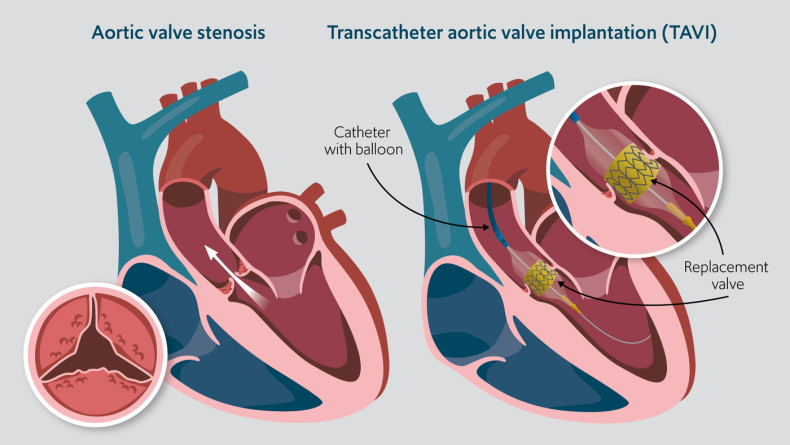
The TAVI procedure: The replacement valve is inserted inside the damaged valve using a catheter.
The benefits of TAVI
“TAVI is short for transcatheter aortic valve implantation, a minimally-invasive procedure to treat aortic stenosis,” explains our consultant cardiologist, Dr Tito Kabir.
Before deciding whether TAVI is the right choice for you, it can help to understand the risks and benefits of the procedure.
The benefits of TAVI include:
- TAVI extends both quality and length of life in patients with severe aortic stenosis
- TAVI reduces distressing symptoms such as chest pain, breathlessness, dizziness and fainting in patients living with aortic stenosis
- TAVI reduces your risk of developing heart failure in the future
- research indicates that people who had TAVI were likely to survive longer and avoid hospital admissions than those who refused surgery
- research shows that TAVI is as, or more effective, than surgical valve replacement in patients that are assessed as high and intermediate risk for traditional open-heart surgery
- TAVI is a minimally invasive procedure linked to a lower risk of infection, shorter hospital stays and a reduced recovery time than traditional open surgery
- small incisions and no sternotomy result in less chest and heart muscle trauma. This reduces post-operative pain and speeds up your recovery
- TAVI is performed under local anaesthetic with conscious sedation, which avoids the risks associated with a general anaesthetic, particularly for people with other medical problems
- surgical valve replacement requires a cardiopulmonary bypass machine to perform the work of your heart during the operation
- you can return to daily activities such as work, exercise and driving sooner
“All these factors can make TAVI more suitable for people who may be too frail or unwell for surgical valve replacement. Research indicates that it is just as effective as conventional surgery for people in whom open valve replacement could be risky,” explains Dr Kabir.
The National Institute for Health and Care Excellence (NICE) released guidelines covering minimally invasive cardiac surgery. The British Heart Valve Society said:
‘The NICE guidance states that transcatheter aortic valve implantation (TAVI) is an option for all patients with an unacceptably high risk of mortality or morbidity from surgery, patients who may have an unacceptably prolonged or strenuous recovery from surgery and also patients with low life expectancy, either due to age or major comorbidities.’
The risks of TAVI?
Although TAVI has many benefits, there are also risks with the procedure. Your cardiology team will work to reduce complications and support your recovery.
The risk of complications with TAVI depends on your heart and your general health. If you have many other illnesses, you may be more vulnerable to problems. Talk to our cardiology team about the relative risks and benefits of treatment.
Potential complications of TAVI are similar to those following surgical valve replacement. These include:
- TAVI can damage the heart’s electrical system, slowing down the heart and resulting in the need for a permanent pacemaker. This is the most common complication of TAVI, affecting between 1 in 20 and 1 in 10 people
- heart rhythm abnormalities: there is a risk of arrhythmias following the procedure.
- any valve damage or replacement increases your chance of developing endocarditis, a rare but serious condition in which the heart’s lining is infected
- paravalvular leak or PVL: there is a risk of blood leaking between the replacement valve and the heart wall. Small leaks are harmless, but larger ones can cause heart failure and increase your risk of developing a valve infection or bacterial endocarditis
- bleeding, bruising or infection at the access site
- damage to an artery that needs surgical repair
- allergy to the dye during angiography
- heart attack
- if there are complications during surgery, there is a risk that you may need open-heart surgery
- stroke: stroke is one of the most distressing valve replacement complications because of the resulting mortality, disability and reduced quality of life. Initially, stroke appeared to be more common following TAVI than surgical valve replacement. However, recent research is less conclusive. Studies suggest that around 3% of people undergoing the procedure are at risk of stroke
Is TAVI right for you?
“Choosing between TAVI, valve replacement surgery, or no surgery is very individual. The right choice for you will depend on your heart, health, age, and preferences,” explains Dr Kabir.
Your cardiac team will be able to advise about your relative risks. Some people may have medical conditions that make a general anaesthetic and open-heart surgery risky. Conversely, the anatomy of your aortic valve may make surgical valve replacement a better option.
When considering the pros and cons, it’s essential to consider your priorities. In one study, around 79.5% of patients questioned said they preferred TAVI. That’s because they valued the advantages like the lower mortality rate, reduced invasiveness, and quicker return to your usual quality of life over the more lasting effects of surgical valve replacement. The age of respondents was probably a significant factor, with younger people more likely to appreciate the greater longevity of surgical valve replacement surgery.
Speak to your team about the risks of treatment for you so that you can balance them against the advantages TAVI offers to your health, wellbeing and quality of life.
Contact us
For more information or to book an appointment, please contact our customer care team.
